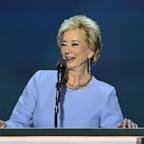Rebuttal witness assails Trump's disclosures
State attorney Kevin Wallace concluded his direct examination of the New York attorney general's second and final rebuttal witness amid frequent objections by defense lawyers.
Lewis attempted to explain how Donald Trump's statements of financial condition failed to disclose that he did not conduct a discounted cash flow analysis, contributing to the over-valuation of some of his assets.
"There is no mention of discounting or future value in the disclosure," Lewis said, disagreeing with testimony from defense expert Jason Flemmons -- as well as former Mazars USA accountant Donald Bender, who testified as a state witness.
“Are you impeaching your own witness?” Engoron asked state attorneys regarding whether Bender’s testimony should no longer be considered credible.
"We didn't feel the need to," Wallace responded.
Lewis also suggested that Trump's external accountants at Mazars had less of an obligation to highlight issues that Flemmons suggested, since they were only conducting a compilation report rather than a more intensive audit. While Mazars had an obligation to flag obvious issues, they were not responsible for ensuring Trump's statements were compliant with generally accepted accounting principles, he testified.
"If while doing the compilation ... something comes to the attention of the accounts that could be a GAAP departure, they have a responsibility to bring that issue to the client," Lewis said regarding generally accepted accounting principles.
During the hour-long direct examination, defense lawyers objected at least 14 times, successfully interrupting the line of questions.
"I am lost," Engoron asked at one point. "Can you put this together?"
The parade of objections visibly irritating Wallace, who voiced his displeasure.
"Petulant outbursts don't really play well in the courtroom," quipped Trump lawyer Chris Kise in response.




